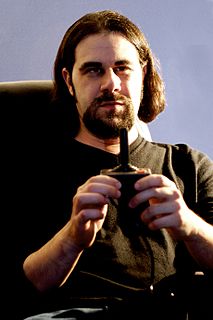A Quote by Barack Obama
In our democracy and our civic discourse, it seems as if folks who take religion the most seriously are sometimes also those who are suspicious of those not like them.
Related Quotes
Inequality also distorts our democracy. It gives an outsized voice to the few who can afford high-priced lobbyists and unlimited campaign contributions, and runs the risk of selling out our democracy to the highest bidder. And it leaves everyone else rightly suspicious that the system in Washington is rigged against them - that our elected representatives aren't looking out for the interests of most Americans.
This is often the way it is in physics - our mistake is not that we take our theories too seriously, but that we do not take them seriously enough. It is always hard to realize that these numbers and equations we play with at our desks have something to do with the real world. Even worse, there often seems to be a general agreement that certain phenomena are just not fit subjects for respectable theoretical and experimental effort.
Religion is an important institution. A nation without religion cannot survive. Yet it is also very important to note that religion is a link between Allah and the individual believer. The brokerage of the pious cannot be permitted. Those who use religion for their own benefit are detestable. We are against such a situation and will not allow it. Those who use religion in such a manner have fooled our people; it is against just such people that we have fought and will continue to fight. Know that whatever conforms to reason, logic, and the advantages and needs of our people conforms equally to Islam. If our religion did not conform to reason and logic, it would not be the perfect religion, the final religion.
We're stuck in these situations with other people and our stuff and our jobs, and thinking that we can extract ourselves from those seems doomed to me. Instead, how can we live within those systems of constraints? We don't have to enjoy them, exactly, but at least acknowledge that those boundaries are real and that they structure our response to the world. And then once you do that, you allow yourself to say "I did my best given the circumstances."
Our dangers, as it seems to me, are not from the outrageous but from the conforming; not from those who rarely and under the lurid glare of obloquy upset our moral complaisance, or shock us with unaccustomed conduct, but from those, the mass of us, who take their virtues and their tastes, like their shirts and their furniture, from the limited patterns which the market offers.
In a democracy it is ultimately for us, the citizens, to judge where to place the balance between security and privacy, safety and liberty. It's our lives and liberties that are threatened, not only by terrorism but also by massive depredations of our privacy in the name of counter-terrorism. If those companies from which governments actually take most of our intimate details want to show that they are still on the side of the angels, they had better join this struggle for transparency too.
Fathers are still considered the most important "doers" in our culture, and in most families they are that. Girls see them as thefamily authorities on careers, and so fathers' encouragement and counsel is important to them. When fathers don't take their daughters' achievements and plans seriously, girls sometimes have trouble taking themselves seriously.
On this Thanksgiving, as we spend time with our family and friends, let's all reflect on what we're thankful for in our own lives. And let's remember those who cannot be with their loved ones because they're serving overseas. But let's also do our part to help those who have no place to go for a meal. I encourage all Americans to do what they can to help those in need-because the best way to show our gratitude for what we have is by doing our part for those who have less.
How can our industry better represent the reality of our larger community and provide our next generation a proper example of what they see around them every single day? This representation should also look beyond race and include those of all body types, religion, sexuality, and gender identification.
The desire for story is very, very deep in human beings. We are the only creature in the world that does this; we are the only creature that tells stories, and sometimes those are true stories and sometimes those are made up stories. Then there are the larger stories, the grand narratives that we live in, which are things like nation and family and clan and so on. Those stories are considered to be treated reverentially. They need to be part of the way in which we conduct the discourse of our lives and to prevent people from doing something very damaging to human nature.































